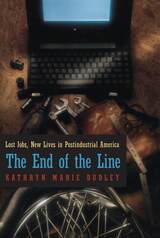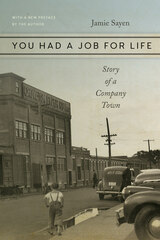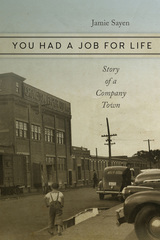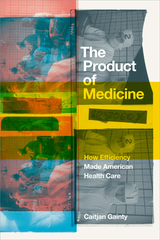4 books about Plant shutdowns

The End of the Line
Lost Jobs, New Lives in Postindustrial America
Kathryn Marie Dudley
University of Chicago Press, 1994
The End of the Line tells the story of the 1988 closing of the Chrysler assembly plant in Kenosha, Wisconsin. Kathryn Marie Dudley uses interviews with residents to chart the often confusing process of change that deindustrialization forced on every corner of the community. This honest, moving portrait of one town's radical shift from a manufacturing to a postindustrial economy will redefine the way Americans think about our families, communities, and future.
"An excellent study not only of the cultural disruptions caused by the shutdown of Chrysler's operations in Kenosha, Wisconsin, but also of the ideology of progress that abetted the shutdown."—Stephen Amberg, Industrial and Labor Relations Review
"With the eye of an anthropologist, [Dudley] examines the tensions between the 'culture of hands' and the 'culture of mind.' Her account is especially instructive because, by many measures, Kenosha has successfully recovered, yet for many the pain still remains."—Booklist
"Exceptional. . . . Should be widely read."—Douglas Harper, Contemporary Sociology
"Make[s] clear what a tenuous concept economic security is, especially when the rules for achieving security are in flux."—Barbara Presley Noble, New York Times
"An excellent study not only of the cultural disruptions caused by the shutdown of Chrysler's operations in Kenosha, Wisconsin, but also of the ideology of progress that abetted the shutdown."—Stephen Amberg, Industrial and Labor Relations Review
"With the eye of an anthropologist, [Dudley] examines the tensions between the 'culture of hands' and the 'culture of mind.' Her account is especially instructive because, by many measures, Kenosha has successfully recovered, yet for many the pain still remains."—Booklist
"Exceptional. . . . Should be widely read."—Douglas Harper, Contemporary Sociology
"Make[s] clear what a tenuous concept economic security is, especially when the rules for achieving security are in flux."—Barbara Presley Noble, New York Times
[more]

The Trade-Off Myth
Fact And Fiction About Jobs And The Environment
Eban Goodstein
Island Press, 2000
Many Americans believe three things about jobs and the environment: that the implementation of environmental protection measures has created ongoing, widespread unemployment; that it has caused large numbers of plant shutdowns and layoffs in manufacturing; and that it has led many U.S. firms to flee to developing countries with lax environmental regulations. Virtually all economists who have studied the issue agree that each of these propositions is false.In The Trade-Off Myth, economist Eban Goodstein provides an in-depth examination of the deep-seated, but ultimately mistaken, American belief in a widespread jobs-environment trade-off. Remarkably, his is the first book to state unambiguously the truth about jobs and the environment. Goodstein offers a readable and accessible analysis of the labor impacts of environmental regulation, as he: considers the roots and staying power of misperceptions regarding job security and environmental regulation analyzes various models used to predict employment impacts, and explains how changes in assumptions can drastically change predicted outcomes lists and debunks, myth-by-myth, widely held perceptions about the impacts of environmental regulation on jobs examines localized hardships caused by environmental protection measures within specific industries and regions, and considers what can be done to mitigate those impacts explores the revisionist view that environmental protection measures can actually create jobs looks at jobs-environment issues that are likely to emerge as we attack the problem of global warming.The Trade-Off Myth presents in clear, accessible language the consensus of economists who have examined the jobs-environment issue, and offers the first comprehensive look at the truth behind the myths that pervade discourse on environmental regulation. It will be essential reading for environmentalists, concerned citizens, policymakers, public officials, and anyone involved with debates over strengthening environmental regulations.
[more]

You Had a Job for Life
Story of a Company Town
Jamie Sayen
Brandeis University Press, 2023
A local story with profound national implications, now available as a paperback with a new preface by the author.
Absentee owners. Single-minded concern for the bottom line. Friction between workers and management. Hostile takeovers at the hands of avaricious and unaccountable multinational interests. The story of America’s industrial decline is all too familiar—and yet, somehow, still hard to fathom. Jamie Sayen spent years interviewing residents of Groveton, New Hampshire, about the century-long saga of their company town. The community’s paper mill had been its economic engine since the early twentieth century. Purchased and revived by local owners in the postwar decades, the mill merged with Diamond International in 1968. It fell victim to Anglo-French financier James Goldsmith’s hostile takeover in 1982, then suffered through a series of owners with no roots in the community until its eventual demise in 2007. Drawing on conversations with scores of former mill workers, Sayen reconstructs the mill’s human history: the smells of pulp and wood, the injuries and deaths, the struggles of women for equal pay and fair treatment, and the devastating impact of global capitalism on a small New England town. This is a heartbreaking story of the decimation of industrial America.
Absentee owners. Single-minded concern for the bottom line. Friction between workers and management. Hostile takeovers at the hands of avaricious and unaccountable multinational interests. The story of America’s industrial decline is all too familiar—and yet, somehow, still hard to fathom. Jamie Sayen spent years interviewing residents of Groveton, New Hampshire, about the century-long saga of their company town. The community’s paper mill had been its economic engine since the early twentieth century. Purchased and revived by local owners in the postwar decades, the mill merged with Diamond International in 1968. It fell victim to Anglo-French financier James Goldsmith’s hostile takeover in 1982, then suffered through a series of owners with no roots in the community until its eventual demise in 2007. Drawing on conversations with scores of former mill workers, Sayen reconstructs the mill’s human history: the smells of pulp and wood, the injuries and deaths, the struggles of women for equal pay and fair treatment, and the devastating impact of global capitalism on a small New England town. This is a heartbreaking story of the decimation of industrial America.
[more]

You Had a Job for Life
Story of a Company Town
Jamie Sayen
University Press of New England, 2017
Absentee owners. Single-minded concern for the bottom line. Friction between workers and management. Hostile takeovers at the hands of avaricious and unaccountable multinational interests. The story of America’s industrial decline is all too familiar—and yet, somehow, still hard to fathom. Jamie Sayen spent years interviewing residents of Groveton, New Hampshire, about the century-long saga of their company town. The community’s paper mill had been its economic engine since the early twentieth century. Purchased and revived by local owners in the postwar decades, the mill merged with Diamond International in 1968. It fell victim to Anglo-French financier James Goldsmith’s hostile takeover in 1982, then suffered through a series of owners with no roots in the community until its eventual demise in 2007. Drawing on conversations with scores of former mill workers, Sayen reconstructs the mill’s human history: the smells of pulp and wood, the injuries and deaths, the struggles of women for equal pay and fair treatment, and the devastating impact of global capitalism on a small New England town. This is a heartbreaking story of the decimation of industrial America.
[more]
READERS
Browse our collection.
PUBLISHERS
See BiblioVault's publisher services.
STUDENT SERVICES
Files for college accessibility offices.
UChicago Accessibility Resources
home | accessibility | search | about | contact us
BiblioVault ® 2001 - 2025
The University of Chicago Press









